Getting an online art history degree can help you develop knowledge and appreciation of both art and history.
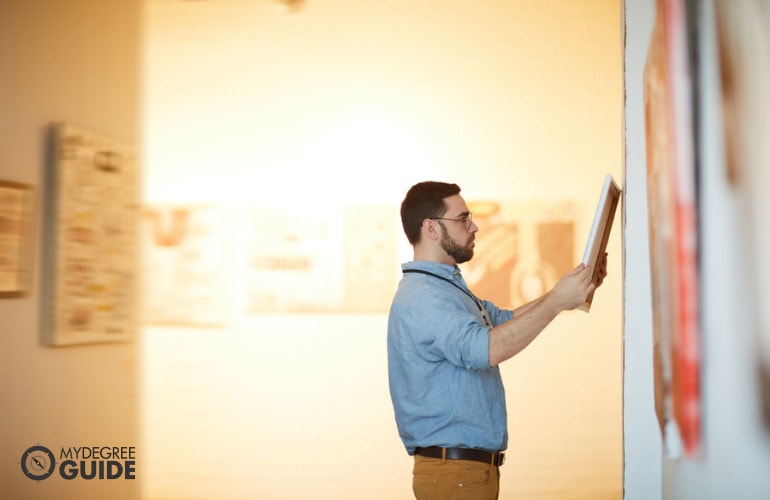
Some art history majors choose to pursue careers working with museums, in teaching or publishing roles, or in a range of creative roles.
Editorial Listing ShortCode:
As an art history major, you have opportunities to learn about seminal works of art, key periods in art history, creative and visual communication methods, and perspectives in the field of art theory and criticism.
Universities Offering Online Bachelors in Art History Degree Programs
Methodology: The following school list is in alphabetical order. To be included, a college or university must be regionally accredited and offer degree programs online or in a hybrid format.
Academy of Art University
The Academy of Art University offers both a Bachelor of Arts in Art History and a Bachelor of Fine Arts in Art History. Both programs offer online classes that are either 7.5 or 15 weeks long and require 120 credits to graduate. While the BA offers more electives, the BFA offers more studio credits. Applicants may apply online.
Academy of Art University is accredited by the Western Association of Schools and Colleges.
Arizona State University
Arizona State University offers an online Bachelor of Arts in Art History program. Students must complete 120 credit hours, and classes are 7.5 weeks long. Those interested in the program may apply online with SAT or ACT scores. To be eligible, applicants need a GPA of 3.0 or higher.
ASU is accredited by the Higher Learning Commission.
Carlow University
Carlow University offers a Bachelor of Arts in Art History. The program offers some online options and requires students to complete 120 credit hours to graduate.
Those interested in the program may apply online anytime to start during the fall, spring, or summer terms. Official transcripts from previously attended institutions must be submitted when applying.
Carlow University is accredited by the Middle States Commission on Higher Education.
Fort Hays State University
Fort Hays State University offers a Bachelor of Arts with a concentration in Art History. To graduate, students must complete 120 credit hours, including 55 credits in art and design. Those interested in the program may apply online with official transcripts and ACT or SAT scores.
FHSU is accredited by the Higher Learning Commission.
Lindenwood University
Lindenwood University offers an online Bachelor of Art History and Visual Culture. Students are typically in the program for 2 to 4 years and are required to complete 120 credit hours to graduate. To be eligible for the program, applicants must submit an online application with official transcripts, a resume, and a letter of intent.
Lindenwood University is accredited by the Higher Learning Commission.
Mansfield University
Mansfield University offers an online Bachelor of Art History program. To graduate, students must complete 120 credit hours, with 35 credits dedicated to electives and 30 to core courses. Those interested in the program must submit an online application with official high school transcripts and ACT or SAT scores.
Mansfield is accredited by the Middle States Commission on Higher Education.
SUNY Empire State College
Students at SUNY Empire State College’s School of Arts and Humanities can create custom concentrations when pursuing bachelor’s degrees in cultural studies, the arts, or history. The school offers a number of online courses focusing on art history. Those interested in the school may apply online with official transcripts and an application essay.
SUNY Empire State College is accredited by the Middle States Commission on Higher Education.
University of Massachusetts – Lowell
The University of Massachusetts—Lowell offers a Bachelor’s in Liberal Arts with a concentration in Art History. Students in the program can select two concentrations and must obtain 120 credits to graduate. An application may be filled out online or mailed to the school.
The University of Massachusetts – Lowell is accredited by the New England Commission of Higher Education.
University of Montana
The University of Montana offers a Bachelor of Arts in Art with a number of Art History courses. To graduate, students must complete 57 credit hours with a GPA of 3.0. Applicants interested in the program must apply online with ACT or SAT scores and official high school transcripts.
The University of Montana is accredited by the Northwest Commission on Colleges and Universities.
University of West Georgia
The University of West Georgia offers a Bachelor of Arts with a major in Art History. To graduate, students must complete 120 credit hours within 4 years. The program is designed to allow students to obtain a minor at the same time. Applicants must apply online with official high school transcripts.
The University of West Georgia is accredited by the Southern Association of Colleges and Schools Commission on Colleges.
Online Art History Degrees
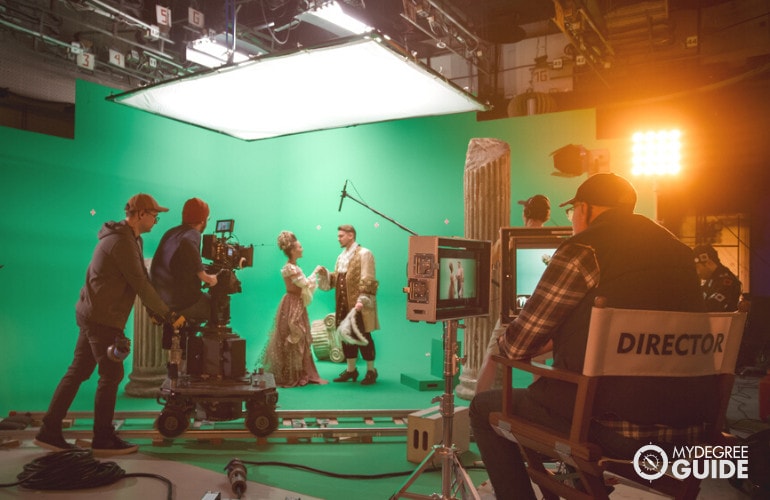
Art history online degree programs typically involve courses that cover art history topics based on time periods, critical art concepts, cultural and social influences, and geographical concentrations:
- Western Art
- Asian Art
- Masterpieces of the Italian Renaissance
- Primitive and Ancient Art
- Medieval Art
- Classicism, Impressionism, and Modernism
While painting may be emphasized over other forms, most art history programs also include study of sculpture, architectural styles and expression, and folk art. You may also have the option to choose some courses based on various areas of concentration, such as Western art vs. Asian art or ancient art vs. modern art.
There are also programs that offer courses in any number of intriguing topics, such as:
- History of art criticism
- Art and religion
- Art and politics
- Industrial art
- Visual communication theory
- Art appraising
Art history majors can develop a range of versatile research and communication skills as well as knowledge related to culture, philosophy, and history. These skills can apply to a range of industries. Some graduates decide to pursue careers directly related to their major, such as historian, museum curator, or teacher.
Art History Careers & Salaries
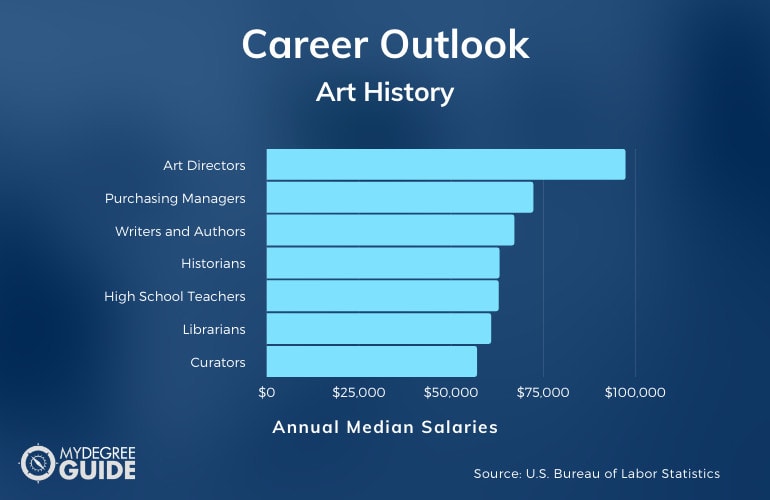
With a BA in Art History, you might still need either additional education, licensing, certifications, or professional training and experience for a number of careers related to your major.
That said, a bachelors in art history could help you gain specialized knowledge in the art field as well as a range of research, writing, communication, and critical thinking skills. According to the Bureau of Labor Statistics, some art history majors might find these related careers intriguing:
| Careers | Annual Median Salaries |
| Art Directors | $97,270 |
| Purchasing Managers, Buyers, and Purchasing Agents | $72,270 |
| Writers and Authors | $67,120 |
| Historians | $63,100 |
| High School Teachers | $62,870 |
| Librarians and Library Media Specialists | $60,820 |
| Curators | $56,990 |
| Archivists | $56,760 |
| Meeting, Convention, and Event Planners | $51,560 |
| Museum Technicians and Conservators | $45,710 |
You’ll likely need advanced degrees for careers such as historian, museum curator, or postsecondary teacher. You may need additional degrees or specialized training or licensing for other jobs listed here as well.
For example, some art history majors might also study education and obtain a secondary teaching credential. They may even develop skills related to specific jobs, such as library science, publishing, museum curator roles, or art marketing.
Art History Curriculum & Courses

Curriculum and courses will vary by school and program, but a bachelors in art history should help you acquire broad foundations in art history and art criticism.
Art history courses are typically organized around geographical settings, historical periods, and art movements or trends:
- Introduction to Early Western Art: This course is an introduction to Mediterranean and European art of the ancient, medieval, Renaissance, and early modern periods. You’ll also study the context of historical and social ideas and influences.
- Fundamentals of Art Appreciation: You’ll apply key historical, technical, and theoretical concepts relating to history and art to gain more informed and insightful appreciation and interpretation of works of art.
- Styles and Themes in Modern Western Art: This course examines the origins and influence of critical visual styles and techniques in Western art from the Renaissance through the modern period.
- Survey of Asian Art: This course provides an overview of key historical influences and esthetic principles in Asian art, ceramics, and calligraphy, from the ancient period to the early Middle Ages.
- Art and Ideology: You’ll study key developments in Western art in the context of prominent socio-historic influences related to political and religious ideologies and institutions, from the Roman Empire through the Middle Ages.
- The Renaissance Artist: This course looks at art through the lens of the individuality of the great artists of the Italian Renaissance, including painting, sculpture, and architecture.
- Primitive Art: In this course, you’ll survey artistic expression from artifacts dating back to primitive cultures, including cave paintings, pagan statues, and a range of abstract and figurative decorative motifs.
- Art in Early Modern Societies: This course looks at the relationship between the development of new artistic styles and early modern movements, such as the industrial revolution, the communist revolution, and nationalism.
- Modern and Post-Modern Art: In this course, you’ll survey and critique a range of modern and post-modern artistic styles and trends.
- Critical Art Theory: You’ll explore a range of topics and perspectives in contemporary art, with an emphasis on historical, social, and theoretical approaches to art criticism.
It’s likely that your art history courses won’t involve any specialized technical or math skills. You’ll often need to apply research, reading, critical thinking, and communication skills.
Admissions Requirements

Here are some common requirements for admission to a bachelors program:
- SAT or ACT scores (only some schools require them)
- High school diploma or equivalent
- Satisfactory GPA
- Personal statement
The requirements listed here are fairly typical, but admissions requirements will vary by school and program. There may also be an application fee.
Accreditation
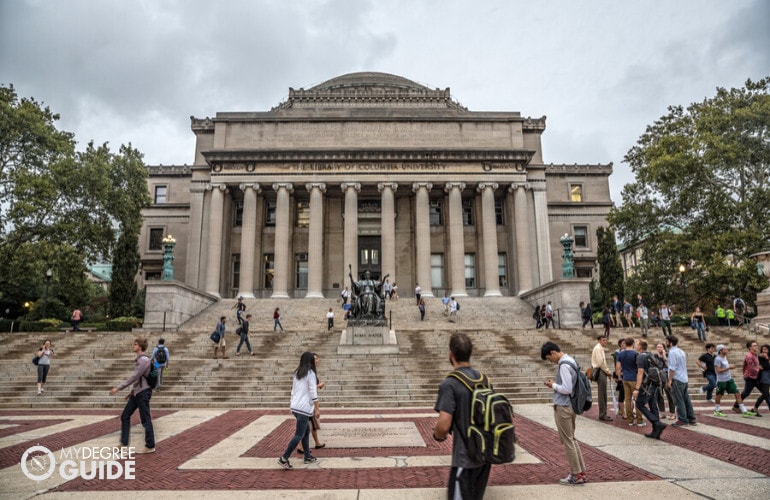
As you consider which online degree offerings in art history are best suited for your goals and interests, it’s beneficial to consider fully accredited schools. By sticking with schools that have been granted regional accreditation, you can be more confident that you’ll receive quality curriculum, instruction, and supportive student services.
Accreditation can also be a precondition for some forms of financial aid. It can also be a requirement for professional licensing or certification. Accreditation can also factor into your credits’ transferability. For more information on accreditation or finding accredited schools, you can check out the Council for Higher Education Accreditation (CHEA).
Financial Aid and Scholarships

It can be helpful to weigh your long-term learning and career goals against the cost of tuition and related expenses. That said, if you qualify for financial aid or scholarships, they can often help you cover upfront education costs.
Common need-based forms of financial assistance include state and federal grants. You may also be eligible for school scholarships or any number of other need-based or merit-based scholarships. The terms of student loans and other offers can vary, so it’s beneficial to review all offers carefully.
Anticipating you’ll need financial assistance? Filling out the Free Application for Federal Student Aid (FAFSA) can be a good first step.
Should I Major in Art History?
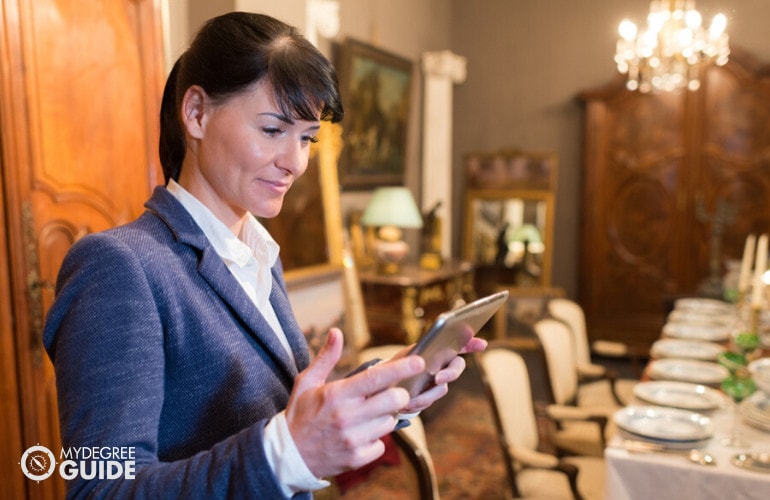
Most students want to consider a range of majors before making a long-term investment in their education.
Choosing a major that you find interesting and engaging can help motivate you and may even help you succeed in school. You may also want to consider the pros and cons of different majors when it comes to your career goals and other life interests.
When choosing any major, most people consider both intrinsic rewards and practical professional interests.
Is an Art History Degree Useless?

While some may think art history is not a highly practical major, getting a degree in art history can help you develop broad humanistic and professional skills and insights.
With the right degrees and training, art history majors may find a fairly direct path to various careers, including roles in education and museums. Professionals in the field also work in art sales and marketing or event planning.
The Bureau of Labor Statistics projects 13% job growth for curators, 12% growth for museum technicians and conservators, 8% growth for meeting, convention, and event planners over the next ten years.
What Can You Do with an Art History Degree?

Getting an art history degree could be a first step toward a position in a museum or the field of academics. Some art history professionals work as art directors, event planners, museum technicians, and purchasing agents.
Other art history majors go on to pursue graduate degrees or additional certifications. With specialized training or credentials, they may choose the career path of historian, teacher, researcher, librarian, archivist, or curator.
An online degree in art history can also enable you to develop humanistic and professional skill sets, which can be beneficial in a variety of positions.
Can You Get an Art History Degree Online?

Yes, there are many accredited schools today that offer flexible online learning formats for students interested in earning an art history degree online.
When researching online degrees, it can help to look for programs that offer the learning options and concentrations that best fit your individual and professional learning goals.
There are also online programs that offer accelerated degree tracks, while others have options for more flexible, part-time study formats. Tuition costs and admissions requirements can also vary from school and school.
How Long Does It Take to Get an Online Degree in Art History?

If you’re following a traditional 16 week semester, finishing a bachelor’s degree program typically takes 4 years with a full-time course load.
Some bachelor programs offer accelerated formats with 8 week terms. If you follow a more accelerated study option with continuous, year-round enrollment, you might be able to finish in less time.
On the other hand, enrolling as a part-time student can enable you to balance academic studies with other life responsibilities, but it may take you longer to complete your degree.
Is a Bachelors in Art History Worth It?

Yes, a bachelors in art history is worth it for many students. As an art history major, you have the opportunity to develop new historical and cultural perspectives and to hone your research, critical thinking, and written communication skills.
Careers in the art history domain include art director, teacher, art appraiser, library media specialist, art marketing specialist, writer or publisher, and museum archivist or curator. Some of these careers require additional credentials or graduate degrees in art history or a complementary field.
According to the Bureau of Labor Statistics, employment for education, training, and library occupations is expected to grow 5% over the next ten years.
Getting Your Art History Degree Online

If art history excites you intellectually, you may consider pursuing a degree in art history. An art history program can enable you to develop your critical thinking skills as well as your communication skills.
In addition, a growing number of accredited institutions now offer online learning options, such as online art history masters degree and bachelors degree programs. A number of schools also offer art history associates degree online options. Online degree programs are often known for their convenience and their flexible schedules.
There are many art history degree programs available that offer different concentrations and learning options. You can start researching accredited colleges and universities today to find the online program that’s the best fit for your learning goals and professional aspirations.
